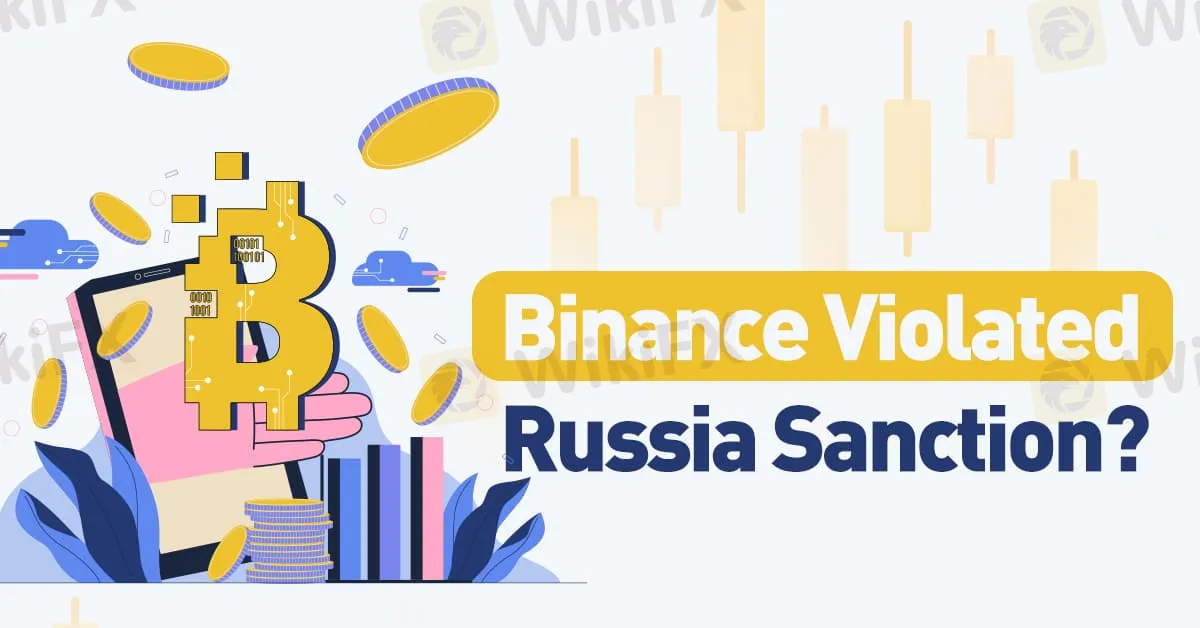简体中文
繁體中文
English
Pусский
日本語
ภาษาไทย
Tiếng Việt
Bahasa Indonesia
Español
हिन्दी
Filippiiniläinen
Français
Deutsch
Português
Türkçe
한국어
العربية
Binance Violated Russia Sanction?
Abstract:Amidst allegations of aiding peer-to-peer crypto transactions using sanctioned banks and ongoing legal battles, Binance finds itself at the intersection of international scrutiny and legal challenges.

Binance, the prominent cryptocurrency platform, has reportedly facilitated peer-to-peer (P2P) crypto transfers within the Russian populace, utilizing a network of at least five banks subject to sanctions imposed by Western governments. This revelation emerged against Russia's extensive military incursion into Ukraine last year. As highlighted in a recent Wall Street Journal article published today (Tuesday), the preeminent financial authority in Russia confirmed that these endeavours facilitated approximately $428 million in P2P transactions over a span of five months.
Concurrently, this exposé unfolds as Binance navigates a complex web of legal challenges, notably within the jurisdiction of the United States. In a development that materialized in March, the Commodity Futures Trading Commission (CFTC), an entity that has probed Binance since at least 2021, initiated a legal confrontation against the cryptocurrency exchange. The CFTC's allegations centre around assertions that Binance illicitly operated as an unregulated crypto derivatives exchange on American soil.
Among the litany of accusations, the CFTC contended that Binance, commencing from July 2019, systematically provided guidance to U.S.-based customers on evading the exchange's compliance protocols, a practice inconsistent with the platform's purported prohibition of such users. Nevertheless, Binance has vehemently rebuffed these allegations, presently striving for their outright dismissal through legal channels.
In a separate legal skirmish earlier in June, the U.S. Securities and Exchange Commission (SEC) also unleashed a lawsuit against Binance. The case specifically targeted both the cryptocurrency platform itself and its Founder and CEO, Changpeng Zhao. The SEC's contentions encompassed accusations of facilitating unlawful trading platforms, disseminating unregistered crypto-based securities, and intermingling clients' funds. Presently, Binance is entangled in a rigorous legal contest within the confines of a federal court in the United States, steadfastly contesting the allegations brought forth by the SEC.

BNB, a cryptocurrency intricately associated with the operations of Binance, has descended to its lowest valuation in over a year after a news release highlighting newly surfaced concerns linked to Russian sanctions. This development compounds the burden of increasing regulatory and legal challenges confronting the company. The cryptocurrency token plummeted, reaching a nadir of $204 this past Tuesday afternoon, marking its most feeble position since the cryptocurrency market tumult of June 2022. Subsequently, the token has managed to recover a portion of these losses, presently trading at $205—a reduction of approximately 14% over the preceding week.
The price of the renowned cryptocurrency bitcoin (BTC) has also experienced a descent, slipping to session lows that dipped beneath the threshold of $25,800.
Complicating matters further is the imminent liquidation of a cryptocurrency loan, the collateral for which is secured by a substantial sum of $130 million worth of BNB. This loan, situated within the decentralized finance protocol Venus, exerts additional downward pressure on the token's market price. To mitigate potential fallout, BNB Chain is collaborating closely with Venus to execute a meticulously orchestrated disintegration of the loan, thereby averting the possibility of a “cascading liquidation” that could induce unwarranted upheaval within the market. This strategic decision stems from a resounding endorsement expressed through a comprehensive Venus governance vote.
To alleviate the looming risks associated with liquidation, the development team behind BNB Chain undertook a substantial manoeuvre by liquidating a significant portion of the outstanding debt. This strategic move carried out on Monday, contributed significantly to mitigating the potential effects of liquidation. Adding an intriguing layer to the narrative, blockchain data from Arkham Intelligence indicates that following the partial liquidation, BNB Chain was infused with an influx of $30 million in USDT, a stablecoin originating from a wallet affiliated with Binance.

Disclaimer:
The views in this article only represent the author's personal views, and do not constitute investment advice on this platform. This platform does not guarantee the accuracy, completeness and timeliness of the information in the article, and will not be liable for any loss caused by the use of or reliance on the information in the article.
Read more

The Impact of Interest Rate Decisions on the Forex Market
Interest rate changes determine currency attractiveness, influencing capital flows and exchange rate trends. Understanding this mechanism helps investors navigate the forex market effectively.

How a Housewife Lost RM288,235 in a Facebook Investment Scam
A 47-year-old housewife in Malaysia recently fell victim to an online investment scam, losing a substantial sum of RM288,235 after engaging with a fraudulent scheme advertised on Facebook.

Interactive Brokers Launches Forecast Contracts in Canada for Market Predictions
Interactive Brokers introduces Forecast Contracts in Canada, enabling investors to trade on economic, political, and climate outcomes. Manage risk with ease.

Bank Negara Malaysia Flags 12 New Companies for Unauthorised Activity
Bank Negara Malaysia (BNM) has updated its Financial Consumer Alert List (FCA List) by adding 12 more entities, reinforcing its efforts to warn the public against unregulated financial schemes. Check if your broker made the list!
WikiFX Broker
Latest News
TradingView Brings Live Market Charts to Telegram Users with New Mini App
Trump tariffs: How will India navigate a world on the brink of a trade war?
Interactive Brokers Launches Forecast Contracts in Canada for Market Predictions
Authorities Alert: MAS Impersonation Scam Hits Singapore
Stocks fall again as Trump tariff jitters continue
INFINOX Partners with Acelerador Racing for Porsche Cup Brazil 2025
Regulatory Failures Lead to $150,000 Fine for Thurston Springer
April Forex Trends: EUR/USD, GBP/USD, USD/JPY, AUD/USD, USD/CAD Insights
March Oil Production Declines: How Is the Market Reacting?
Georgia Man Charged in Danbury Kidnapping and Crypto Extortion Plot
Currency Calculator







